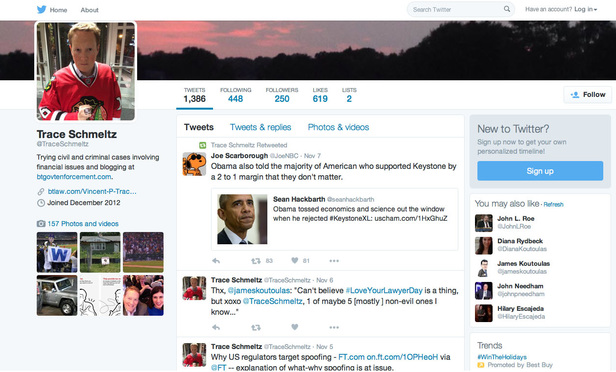READ VINCENT SCHMELTZ’S RESPONSE TO THE COURT
Schmeltz declined to comment Tuesday. Conlon, a former federal prosecutor in Chicago, didn’t return requests for comment.
Federal courts generally prohibit photographing or recording court proceedings. According to court documents in Schmeltz’s case, there was a sign that notified visitors about the no-photography rule posted outside the courtroom where Schmeltz was caught taking photos.
Schmeltz had been tweeting about a high-profile criminal case and also writing about it on his law firm blog. Castillo on Tuesday questioned Schmeltz about whether he was tweeting to generate business, according to Holland & Knight associate Trisha Rich, who observed the hearing. Rich’s practice focuses in part on legal ethics matters.
At one point, according to Rich, Castillo asked Schmeltz about his hourly rate. Schmeltz replied that it was $650. Castillo questioned how the purpose of the tweets wasn’t about business if Schmeltz was in court tweeting instead of earning billable hours. Schmeltz said his purpose was to educate and provide context about the case.
Previous violators of the ban on photography and recording in the Northern District of Illinois paid fines between $50 to $150, plus a $25 processing fee, according to the U.S. Marshals Service.
Schmeltz has no history of public disciplinary action in Illinois or the District of Columbia, according to bar records. Conlon told Castillo that Schmeltz self-reported the tweeting incident to the Attorney Registration & Disciplinary Commission in Illinois and the D.C. Bar, according to Rich.
Bar officials in Illinois and D.C. said they couldn’t confirm whether Schmeltz reported the incident, citing confidentiality policies.
In advance of the next meeting of the judges’ committee, Castillo gave Schmeltz the option of filing a written response about what an appropriate sanction would be. That filing is due Dec. 4.




